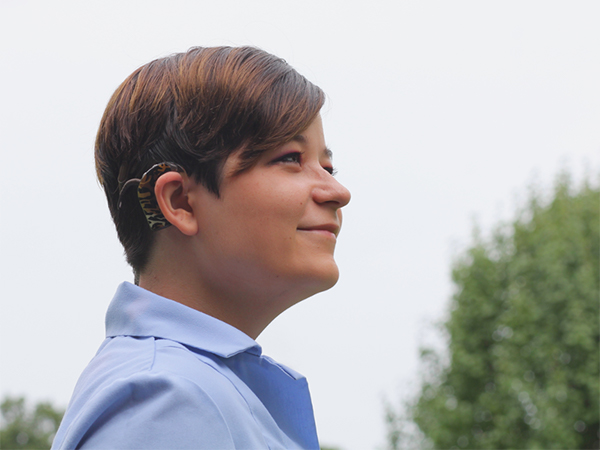
When I was a kid, my favorite TV character was the Bionic Woman, whose robotic ear helped take down villains by hearing their secret conversations. I never envisioned that decades later, I too would have a bionic ear –in the form of a cochlear implant. While it doesn’t give me superpowers, or even normal hearing, my implant has enabled me to function as a productive, engaged member of my workplace and community, and I couldn’t be more grateful.
To be honest, I didn’t always feel this way. For years, I thought that depending on assistive technology would make me appear weak or less competent. I shunned the idea of a cochlear implant, because in my mind, getting one would mean I was really deaf… and being deaf would mean I was disabled. I wasn’t ready to accept that.
Growing up with normal hearing, I guess I never knew any different. So when I was diagnosed with bilateral hearing loss at age 20, all I wanted was to be “normal” again. But normal life, as I knew it, slipped farther and farther out of reach. No matter how hard tried, I couldn’t will myself to hear well again, not even with the most powerful hearing aids. Simple, everyday conversations became a struggle. Life became a struggle.
Only through finding a support network was I able to start turning around my thinking. I met wonderful, knowledgeable people, who were also deaf or hard of hearing, yet living full and productive lives. They helped me learn how to cope with and accept my hearing loss. Several of them also wore cochlear implants.
In them, I was able to see what I hadn’t been able to see in myself. That having a disability does not diminish a person’s ability to contribute, add value, or live a fulfilling life. And that relying on assistive devices is not a sign of weakness, but rather of courage – to look challenge in the face and ask what can be done to surmount those challenges.
My cochlear implant has restored so many sounds I thought I’d never hear again and given me back the ability to communicate without a struggle. It is a constant reminder, not of what I can no longer do, but of all that I can do.
That’s why working at the National Institutes of Health (NIH) holds such personal meaning for me… because the investments in biomedical research have led to advances in medical technologies, including cochlear implants, which have significantly improved the quality of life for people with disabilities. I feel lucky every day to serve at an agency whose work has so positively impacted my life and countless others’ lives. And with technology advancing so quickly, who knows? Maybe scientists will someday develop a bionic ear like that of my childhood idol, with beyond-human abilities to fight crime and save the world. In the meantime, I’ll continue to wear my cochlear implant – and my NIH badge – with gratitude and pride.
Do you have a story idea for us? Do you want to submit a guest blog? If it's about equity, diversity, or inclusion, please submit to edi.stories@nih.gov.
For news, updates, and videos, follow or subscribe to EDI on: Twitter, Instagram, Blog, YouTube.






